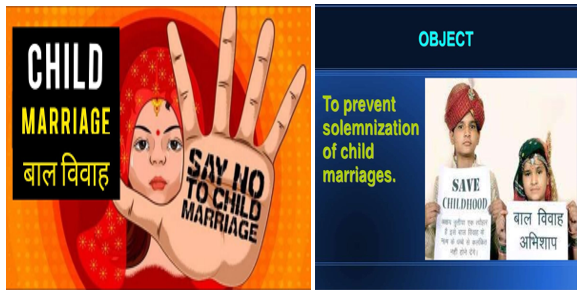
CONTEXT: The Supreme Court recently rejected the government’s plea to apply the Prohibition of Child Marriage Act (PCMA) over personal laws and urged Parliament to consider banning child betrothals.
About the Prohibition of Child Marriage Act (PCMA):
- Enacted in 2006 to prevent child marriages and eliminate the practice.
- Replaced the older Child Marriage Restraint Act of 1929.
- The main goal is to stop child marriages from taking place.
- The law provides measures to prevent child marriages, support victims, and increase penalties for those who arrange or promote such marriages.
Key Provisions:
- Legal Age for Marriage: Boys must be 21 and girls must be 18 to marry. Marriages involving individuals below these ages are illegal and punishable under the law.
- Reporting Child Marriage: Anyone can report a case of child marriage, whether it happens before or after the marriage takes place.
Nodal Officer:
- The District Collector acts as the Nodal Officer at the district level to ensure the Act is properly implemented.
- The District Collector is responsible for regularly reviewing the Act’s enforcement and taking necessary steps for its proper implementation.
- Child Marriage Prohibition Officers (CMPOs) are appointed in each state to prevent child marriages, protect victims, and prosecute offenders.
Role of the CMPO:
- CMPOs provide legal aid to victims of child marriage.
- They are responsible for bringing children in need of care to the Child Welfare Committee or a First-Class Judicial Magistrate if no Child Welfare Committee is available.
Filing for Annulment:
- A petition to annul a child marriage can be filed by the boy or girl involved if they were minors (below 18 years) at the time of marriage.
- A guardian, along with the CMPO, can also file an annulment petition if the children are still minors.
- The District Court, including the Family Court or any other designated court, can grant the annulment.
Punishments:
- Child marriage is a punishable offence with hard imprisonment, a fine, or both.
- Courts can issue orders to stop child marriages before they occur.
- Offences under the Act are cognizable (police can arrest without a warrant) and non-bailable.
Protection for Victims:
The law provides housing and financial support to the girl involved in the child marriage.
The law ensures rescued children receive medical aid, legal support, counseling, and rehabilitation.
It grants legal rights to children born from child marriages, including provisions for their custody and maintenance.
